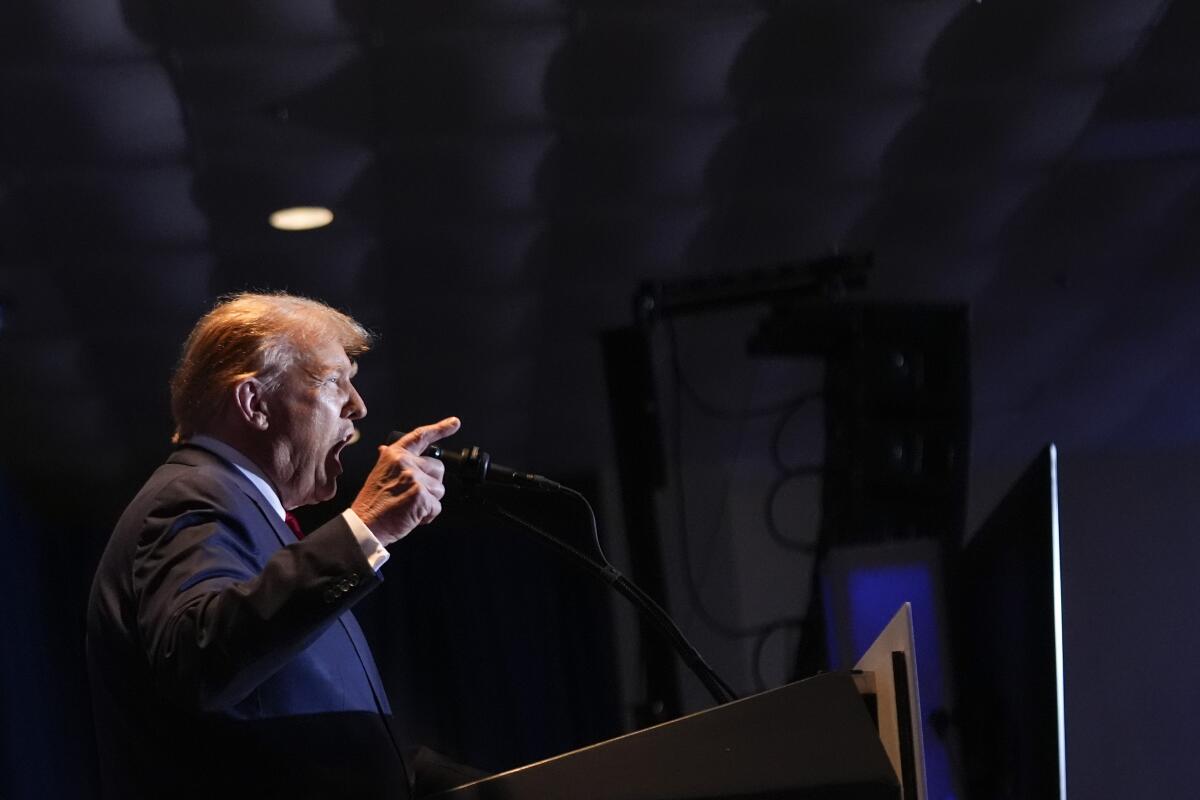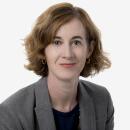Newsletter: Could a politics diet ease polarization and save democracy?

- Share via
Good morning. I’m Kerry Cavanaugh, assistant editorial page editor, filling in for Paul Thornton. It is Saturday, March 30. Let’s look back at the week in Opinion.
I have a confession: I’ve stopped reading much of the Donald Trump news coverage. I skim the headlines and glance at social media commentary but will only invest my time and brain space on the former president when something significant happens. I write mostly about Los Angeles and California issues, so I don’t have to follow every unhinged utterance on the campaign trail or attempt by his legal team to delay justice.
My husband, who is also a journalist, covers legal issues and has been writing and editing stories about the hundreds of people convicted for participating in the Jan. 6 attack on the Capitol and Trump’s various court cases. All that Trump political news is beginning to take a toll on his mental health. He’s becoming more anxious about the presidential election this year and panicked about the future of American democracy.
So I was happy to share with him the recent op-ed by UC San Diego political science professor Seth J. Hill that suggests practical ways for people to stay engaged in politics without becoming mired in it, which isn’t healthful for individuals or for society:
“While political competition theoretically drives efficient and effective governance, it does not follow that all political spending and engagement are necessarily productive. In fact, I’ve come to believe that much of the time and money Americans spend on politics might be driving division more than promoting civic knowledge and participation.”
Hill doesn’t advocate for people to disengage from politics entirely, but rather take a more focused, deliberate approach. Budget how much time or money you will spend on political causes you care about. Stop doom scrolling or watching cable news through the day, and subscribe to a newsletter or two from reputable sources. (Like this one! Or this one!)
Hill continues: “It is within our power to take back control of our time from the doom scrolling and emotional roller coaster of political competition. And taking back our time and attention with a reasoned plan might even push political elites to spend less of their time generating outrage in pursuit of your money and emotions. We can help depolarize our politics by making the spectacle of the 2024 campaign an important but not-too-large part of our lives.”
The future of Los Angeles housing can learn from Silver Lake, Fairfax and Crenshaw. Urban planner Max Podemski makes the case that L.A. already has a template for adding density to residential neighborhoods in the bungalow courts and dingbat apartment buildings that were build in the last century. “Rather than ruining the character of the city, building more diverse density could make the Los Angeles of the future more closely resemble its past.”
The Princess of Wales’ public honesty is appreciated but it wasn’t necessary. Blake Turck writes that her experience with her mother’s cancer allowed her “to understand why even the most public of public people, a woman destined to be a British queen, would keep her diagnosis private.”
Bring buttons and dials back to new cars. Touch screens distract drivers. The screenification has gone too far when you can’t even change windshield wiper speeds, turn on headlights or put the car into park or drive without navigating a touch screen, the Editorial Board argues. “Drivers have enough to worry about on the roads. They shouldn’t have to spend any time thinking about how to control their cars’ most basic functions.”
Enjoying this newsletter? Consider subscribing to the Los Angeles Times
Your support helps us deliver the news that matters most. Become a subscriber.
Why are more Americans dying alone? Professors Pamela Prickett and Stefan Timmermans studied the unclaimed bodies of L.A. County, trying to understand who they are, why they are being abandoned and what accounts for their rising numbers. “We found that something fundamental has changed in America’s families,” they write. And all signs suggest that the numbers of unclaimed will continue to increase.
L.A. may not get another wet winter for a while. We should prepare for drier times. When the rain is falling, it’s really hard to accept drought-focused restrictions, writes the Editorial Board. “But our boom-and-bust water cycle will only become boomier and bustier, so Southern Californians have to keep ripping out lawns, developing waste-water recycling facilities and doing the other things we do to use less water.”
More from this week in opinion
From our columnists
- Robin Abcarian: Who has the moral authority to speak about Israel’s excesses? Certainly not Donald Trump.
- Jackie Calmes: The Supreme Court tackles abortion again. How much will it hurt Republicans in 2024?
- Jonah Goldberg: Why Trump’s running mate is less likely to be Marco Rubio than Marjorie Taylor Greene.
From the Op-Ed desk
- How to skip the college admissions rat race and still get a degree.
- American happiness just hit a new low. Don’t blame your parents.
- California has to conserve water. Why is Sacramento dragging its heels?
From the Editorial Board
- The humanitarian aid Gaza needs most is a cease-fire.
- L.A.’s budget mess means residents could pay more for less service.
- At long last, women finally have a real shot at California’s top job.
Letters to the Editor
- Don’t buy the trucking industry’s $1-trillion price tag for going electric.
- Rebecca Grossman doesn’t want to be in jail. Then she should have driven safely.
- The Baltimore bridge collapse is tragic. This the wrong solution.
Stay in touch.
If you’ve made it this far, you’re the kind of reader who’d benefit from subscribing to our other newsletters and to The Times.
As always, you can share your feedback by emailing me at paul.thornton@latimes.com.
A cure for the common opinion
Get thought-provoking perspectives with our weekly newsletter.
You may occasionally receive promotional content from the Los Angeles Times.







